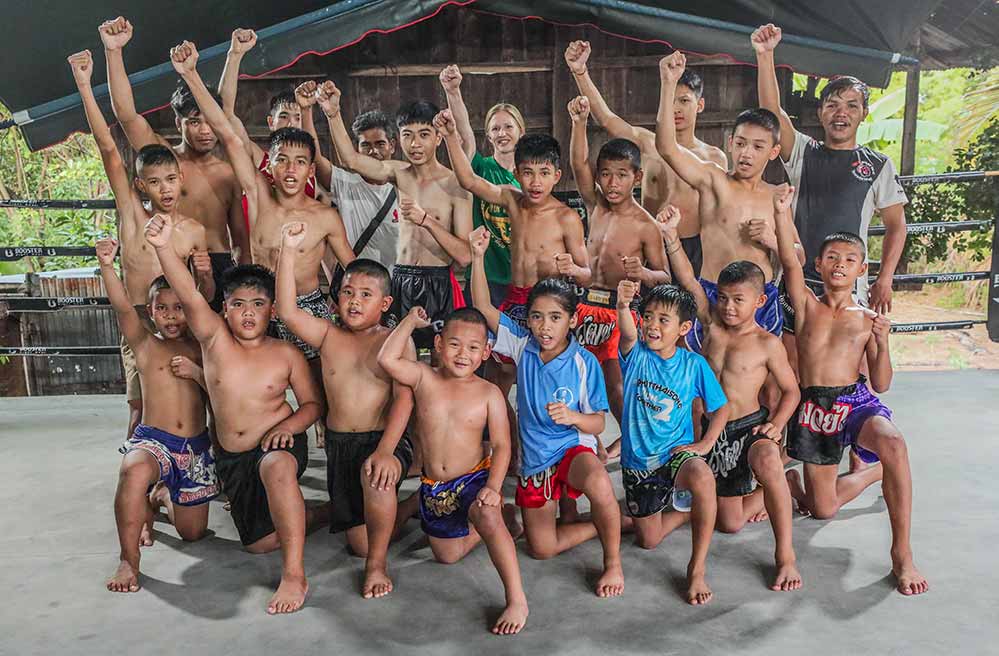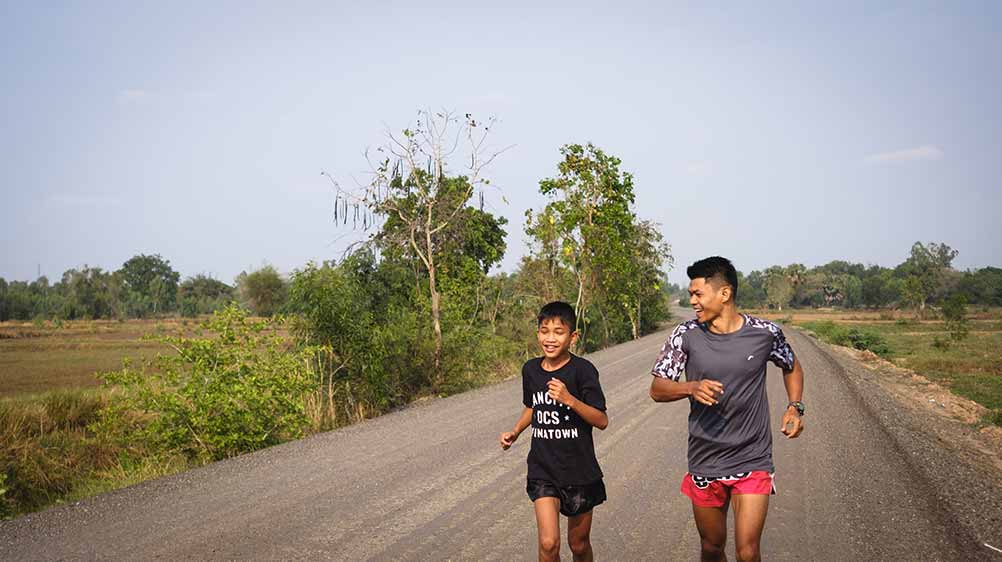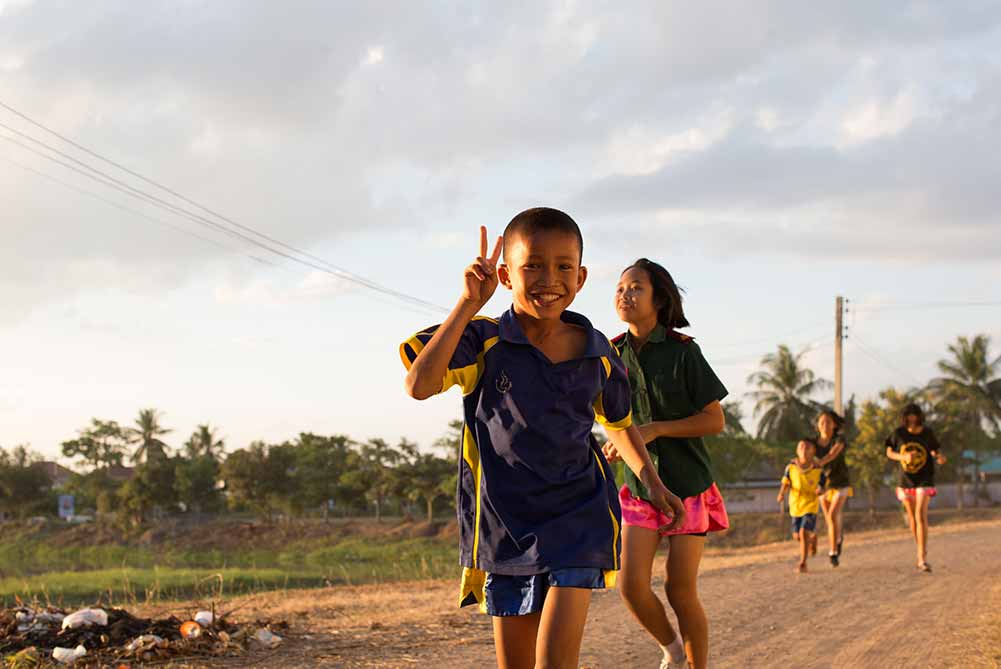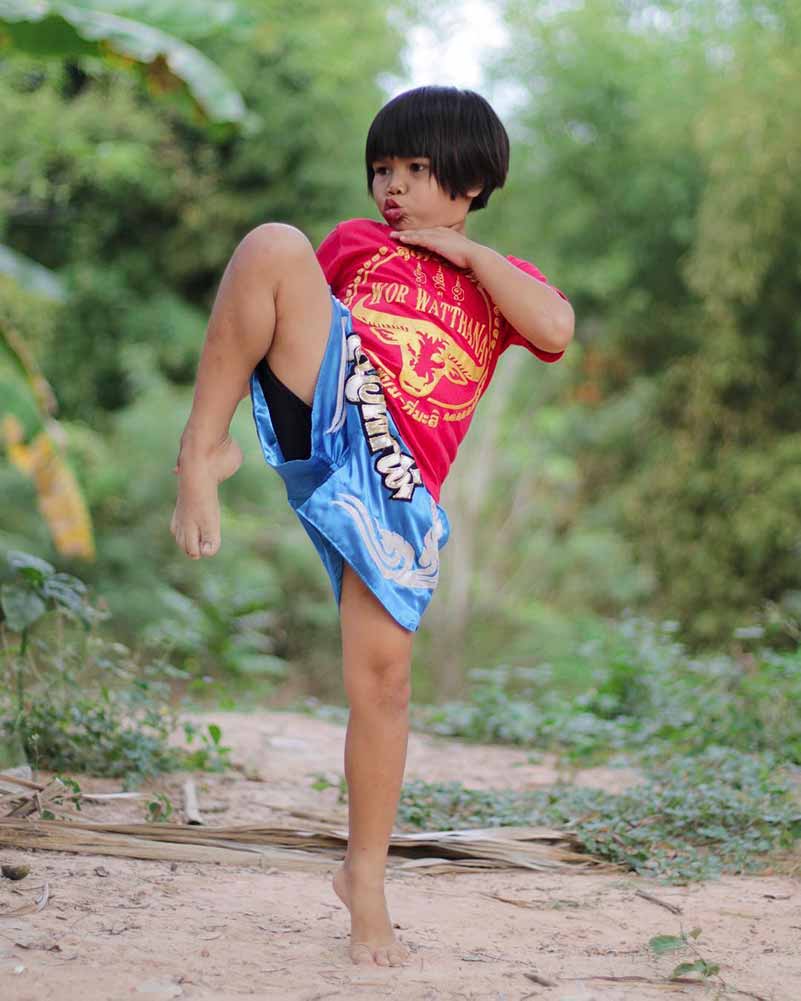Comprised of twenty provinces in the northeast of Thailand, Isan is the nation’s largest region — as well as its poorest. The majority of people there earn a living through agriculture, caught in a constant battle against the area’s poor growing conditions, acidic soils, and propensity for both drought and flooding. It is here, in the village of Krabueang Nok, that you’ll find Wor Watthana Muay Thai Gym, built on an unassuming plot of land that once served as a family garden. A breadth of positive changes have taken hold since it arrived, offering strength and hope to the community of this beautiful yet beleaguered countryside. These changes, brought about by the efforts of a rice-farming family’s humble son and his pro-fighter wife, are largely owed to Thailand’s beloved national sport: Muay Thai.
The “art of eight limbs”, Muay Thai is a definitive part of Thailand’s historical identity, as well as its wildly effective contribution to the world of martial arts. Muay Thai has spread across the globe, popular with people of all walks of life for its high-intensity workouts and its indispensable utility as a fighting style. Muay Thai gyms in Vancouver (or anywhere else in the West) may be fantastic places to get into shape and develop a skill, but in Thailand these places are beacons of community where young fighters can pursue their dream of a better life — assuming they’re lucky enough to be near one.
Thanit “Boom” Watthanaya has devoted his entire life to Muay Thai, practicing it as a fighter and sharing its joys with others as an instructor throughout Asia and North America.
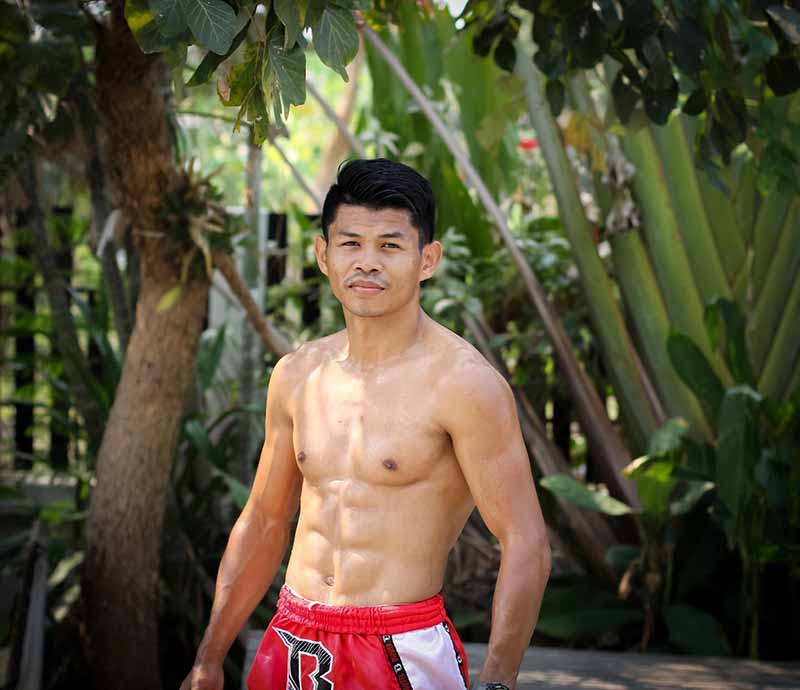
Growing up Isan’s village of Krabueang Nok, Boom witnessed his parents’ struggle to earn a living on their rice farm — as well as their pain when his eldest brother left home to become a fighter. His hometown had little to no electricity in those days, and his brother was left without any means of contacting the family, or vice-versa. They assumed the worst until suddenly, when Thanit was around seven years old, his brother returned. He had found and joined a Muay Thai gym far away, and his account of a life spent training and fighting piqued the interest of young Thanit. Although his brother would soon depart again, the news that even children could earn money by fighting clinched it: Thanit would become a fighter, too.
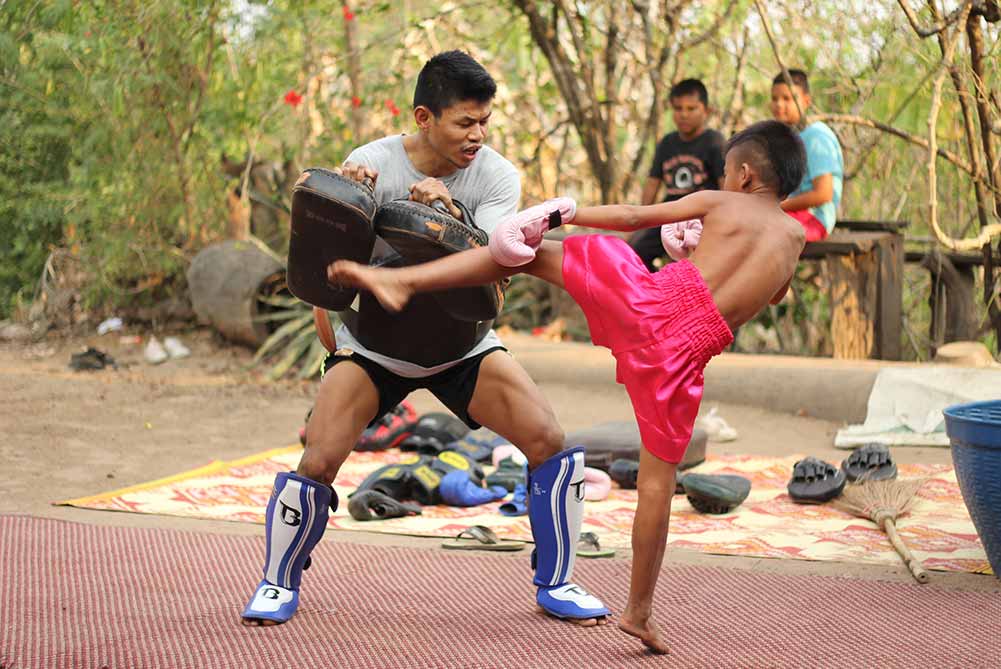
Boom trains a young Muay Thai fighter
He filled a sack with rice husks, strung it up a tree in their yard, and began to practice each day. Over the next six years Thanit trained constantly, fanatically. He did so largely by himself, save for the odd occasion when his elderly neighbour, who had witnessed a few fights, would stop by to impart second-hand technique. Of course, after the departure of his brother, Thanit’s parents were uneasy about the prospect of another son trying to become a professional fighter. When he began accepting his first fights at twelve years old, he tried in vain to conceal it from them — but whether it was an enthusiastic community member running into them at the market or a concerned teacher pointing out that Thanit was skipping school, his parents quickly realized what he was up to. Even setting aside their eldest son’s flight from home, his parent’s apprehension was not unfounded — apart from his neighbour holding pads for him now and again, Boom was entirely self-taught. Worse, his solid physique actually worked against him: because his body looked like that of a professional fighter, he was routinely matched against kids with far more experience.
“Of course, most of my fights at that time…I lost most of them,” he recounts with a chuckle. Luckily, this did little to discourage him, and he continued to take whatever fights he could throughout his teen years.
From age nineteen to twenty Thanit performed a year of required military service, after which he moved to Bangkok in search of work. He secured a job performing menial labour, for a boss who also happened to own a gym. Gyms in Thailand act as fight teams, where members are expected to fight and split their earnings with the gym in exchange for room, board, and training.
In addition to working up to twelve hours a day, Thanit was also made to maintain a constant schedule of training and fighting on behalf of his boss.
Still, for the first time in his life, Thanit was working with real trainers, legitimate training partners, and professional pad holders. To join a proper gym at this age is very uncommon in Thailand; while Thanit was still a teenager sharpening his kicks on a homemade bag, most other fighters in his peer group were training professionally, taking dozens of fights each year. Because of this, his trainers viewed him as something of a rough prospect. They focused on improving his basics, encouraging him to develop his style around heavy punches and low kicks.
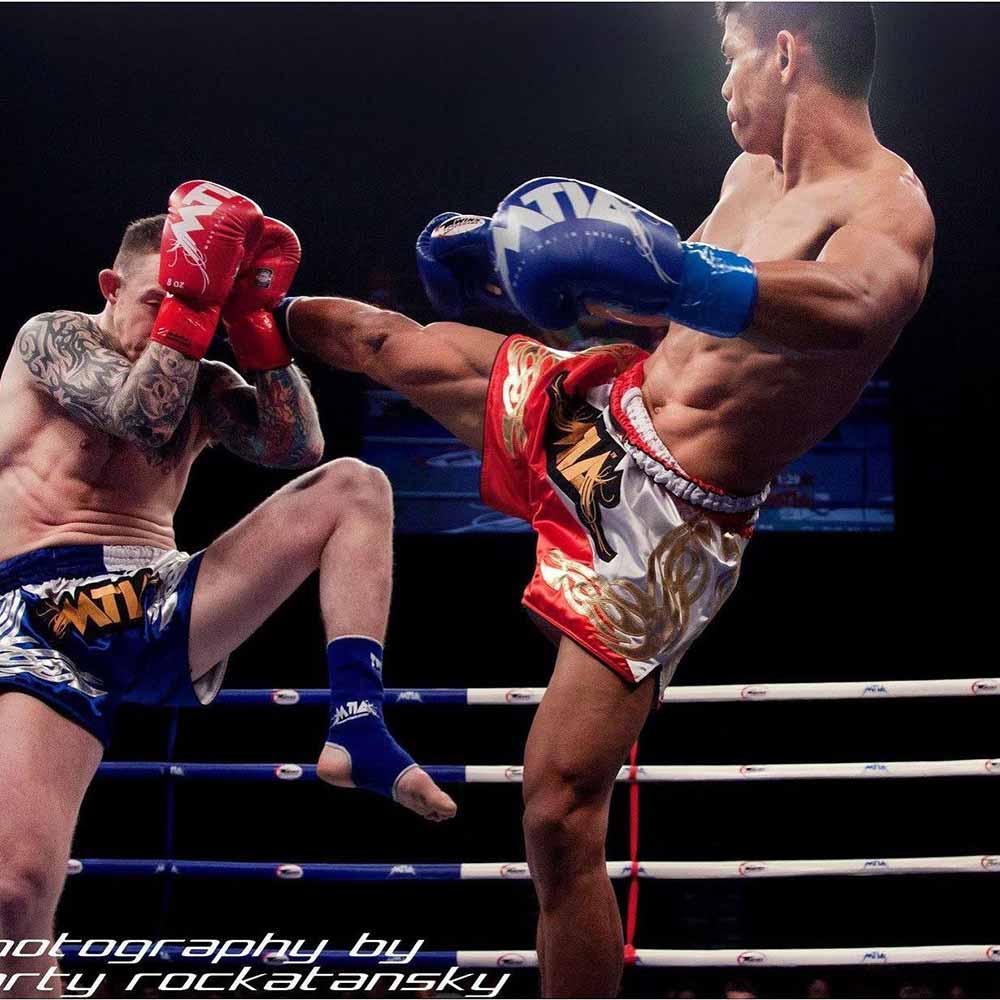
Boom fights in Bangkok, Thailand
Thanit felt himself improving rapidly, even though by his own admission he was fighting with “no timing, no technique”. Regardless, his penchant for mounting fearless attacks earned him a reputation. Several trainers remarked that he fought “like a buffalo — just go, go!”
Strategies such as this often lead to…mixed results. Luckily, Boom is blessed with tremendous power in his strikes. He went on to secure six knockout victories in the seven fights he took while in Bangkok. Indeed, he holds an awful lot of knockouts for a fighter who competes at 118lbs-122lbs. The admittedly incomplete record we have of his professional fights (he estimates around 30 others) lists 19 KOs in 46 wins, and only 12 losses. Boom credits his overhand right in particular, explaining that when you land a hard straight punch, your opponent can sometimes stagger backwards and collect themselves. Conversely, a proper overhand will knock them flat onto their face — and once they’re down, they tend to stay down.
Boom’s trainers soon realized that he simply needed more experience. After all, by this point in their careers most other Thai fighters would have already had fights numbering into the hundreds. They sent him to a gym in the Northern province of Uttaradit, where he could experience the lifestyle of fighting frequently and, hopefully, get more wins under his belt. There was no shortage of bouts for Boom to take, as Uttaradit is home to a yearly festival where every temple hosts Muay Thai events. The fight schedule can sometimes span several months. Although he stayed for less than a year, this is the period Boom identifies as the most important in his career — more so than any other time or particular fight he can recall.
“In my mind, when they said they would send me there, I thought ‘oh, it’s the gym, it’s the big gym’. But it was just a hut, and we trained on the ground. Six or seven other young guys stayed there, too. Lots of good fighters went there to live and train.”
Here, Boom was thrown into the deep end to jump-start his development. At one point, he took on six opponents in just eight days. True to form, Boom won most of the bouts by knockout, with his losses coming by close decision. Such a rigorous fight schedule is, understandably, almost unheard of outside of Thailand. The toughest day came when he faced two opponents, “one in the morning and one at night. That was the hardest time for me”. “I don’t know how I did it. To fight in eight days six times…I did not even get hurt. I heard a story, ‘oh, they fight two times a day, three times a day’…and I thought that is normal. Sometimes, I still think about it now…why did I do that? How did I do that?” Boom pauses, contemplating a different chapter in his life. A smile lights up his face. “But I never got knocked out. I got cut in the face, but I fought anyway. I never got a concussion. I got dropped from a punch…but I never got knocked out”.
Despite this punishing schedule — or, perhaps, because of it — Boom maintains that his timing, adaptability, and technique all improved considerably while in Uttaradit. He had something else in this far away province to be grateful for, too: a young fighter from Canada, whom he had met at the gym in Bangkok, would travel north to visit him (and win a few fights herself). Her name was Frances, and she had made her way from Rossland, British Columbia to Thailand in pursuit of her dream of fighting professionally. Before long, the two would be husband and wife.
“At the time,” Boom recounts, “I couldn’t speak any English, and my wife couldn’t speak any Thai. So I think, at first, it’s just…love”.
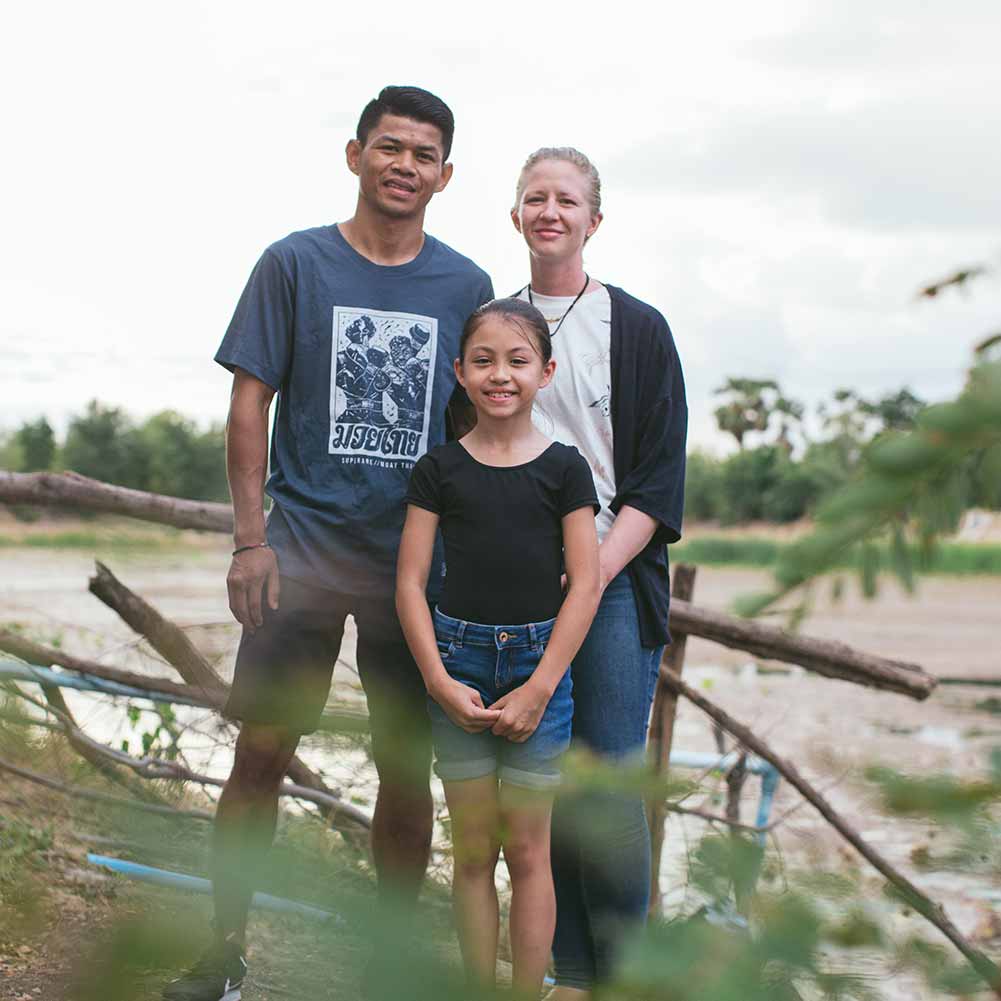
Boom, Frances, and their daughter
The pair fell hard for one another, painstakingly communicating through an English/Thai dictionary. When Boom returned to Bangkok from his trial-by-fire time in Uttaradit, he and Frances were inseparable. After six months together, Frances told her companion that she intended to marry him. They returned to Isan to care for Boom’s ailing mother, and were married shortly thereafter. Although Frances was soon forced to return to British Columbia to finish her degree, she quickly had enough of the distance between them. One month after leaving, she was back in Isan with Thanit and his family.
Frances and Thanit eventually decided that the time was right to relocate to Canada in pursuit of a better life. They arrived in Rossland in 2008 and began saving money to finance a move to Vancouver, where Frances could attend university. Boom took on several landscaping jobs during this period, and a year later they were in Vancouver. Frances obtained her degree from UBC, and within another year they welcomed their baby daughter into the world.
Even in light of so many changes, the couple’s love for Muay Thai never diminished. Boom took seven fights during this period — five in the USA and two in Canada. He had found a welcoming fight team in his new home, including Ryan and Ronald Diaz, founders of the premier MMA gym in Vancouver, Diaz Combat Sports.
The young family returned to Thailand in 2014 to care for Thanit’s ailing father, settling down at the family farm. Life’s pace had slowed considerably since their time in Bangkok and Vancouver, and Boom landed a decent gig as a Muay Thai instructor in Malaysia. Frances, still actively training, decided to set up a small training area in a patch of dirt on the farm. Before long her training began to attract the attention of the local children, with more and more kids asking if they could join in. Finding herself with an ample roster of kids eager to participate in runs and practice Muay Thai, Frances placed a call to her husband about an idea which would drastically alter the course of their lives:
“We should start a gym.”
Immediately, Thanit was on board. Frances posted a short video about her new training partners to FaceBook, which went viral shortly thereafter. This was followed by an outpouring of support from the international Muay Thai community, which prompted her to launch a GoFundMe campaign in 2015. Their dream soon began to take shape. Boom admits that when they started, they didn’t expect that the gym would become what it is today: a fully-equipped training facility with heavy bags, a ring, and plenty of equipment. A place where the whole community can congregate and train in peace.
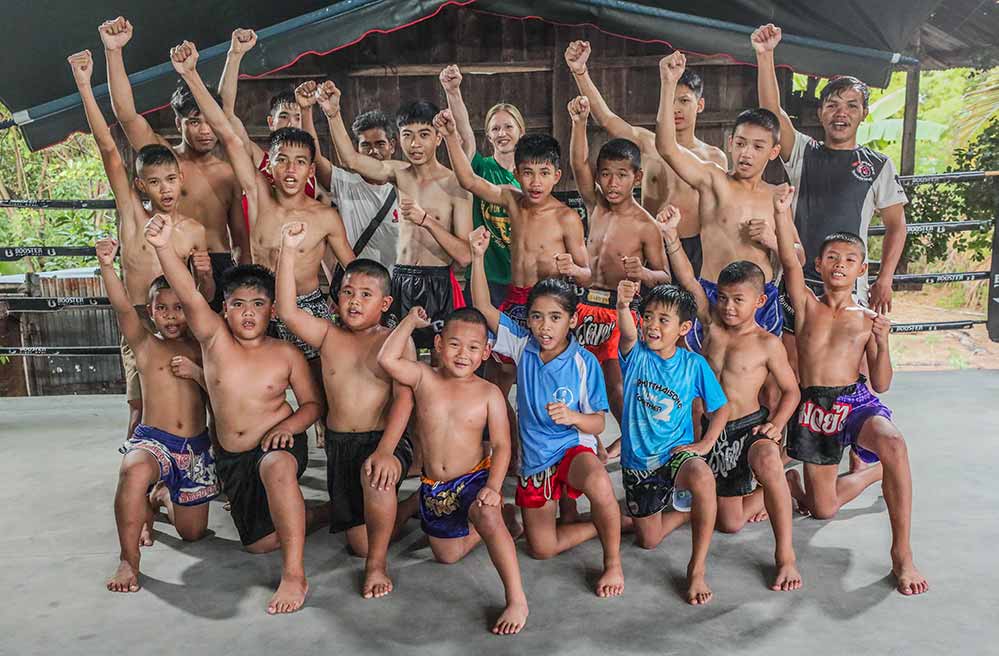
Group photo of the kids at the Watthana camp
“I just wanted a roof to cover us from the rain,” he laughs.
Since the initial success of the GoFundMe campaign, the gym has sustained its growth thanks to the efforts of Boom, Frances, and their regular donors. A few children are able to stay at the pair of apartments rented by Wor Watthana, but the others live with their relatives, usually grandparents, due to limited space and resources. Each day, Frances takes these children to and from school, home, and the gym. The gym provides a safe space with a number of necessities for these kids, whether they intend to become fighters or not.
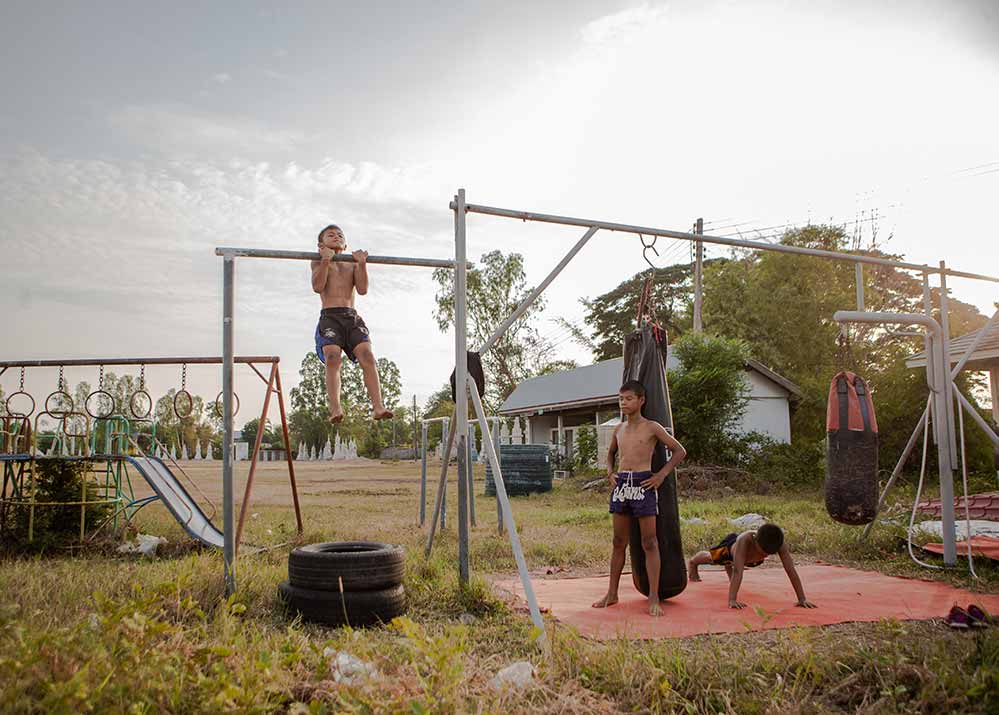
The kids perform calisthenics after training
The children are well fed, often with delicious food gifted by other members of the community, and given nutritional supplements where needed. Clean drinking water is provided for all the kids and their families. Doctor visits and medical expenses are taken care of, as are clothing, shoes, and school fees/uniforms. The couple also takes care to offer the kids extracurricular activities, such as arranging field trips to other gyms/towns and hosting birthday parties for them and their friends. Above all, Wor Watthana Gym is a safe place where the community can congregate, have access to essentials like water and electricity, and work out as they please.
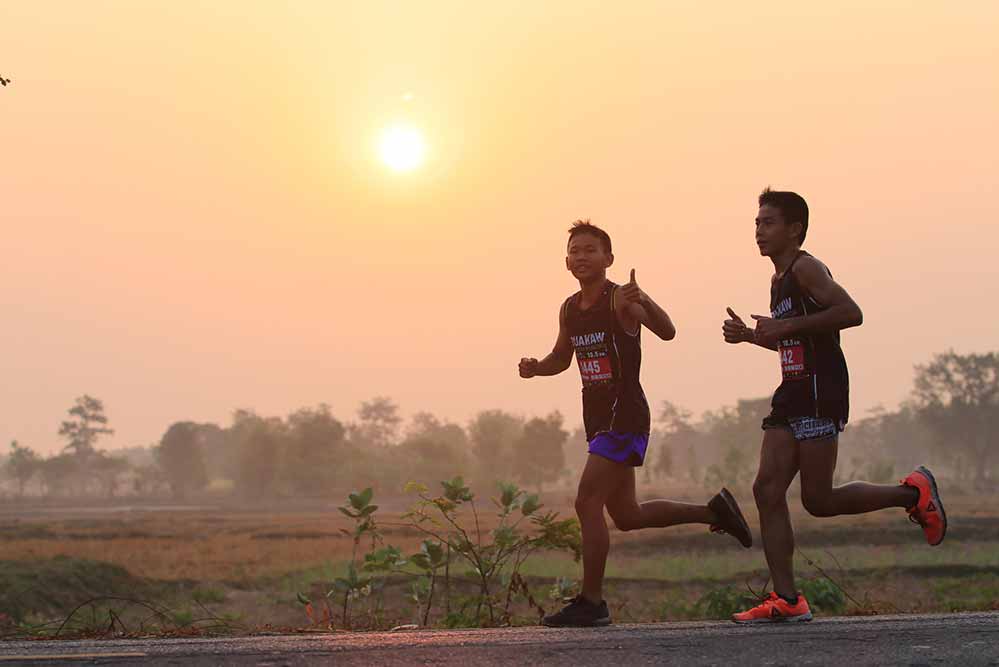 Watthana fighters must run 2x daily
Watthana fighters must run 2x daily
“We are open for everybody to go train there. Even if you don’t want to fight you can use the bag, the ring, whatever, exercise there. Lots of people and kids go to exercise there, do their thing and go home. Lots of old people, too. If someone is really serious and wants to fight, they have to understand that you have to work harder than the others.”
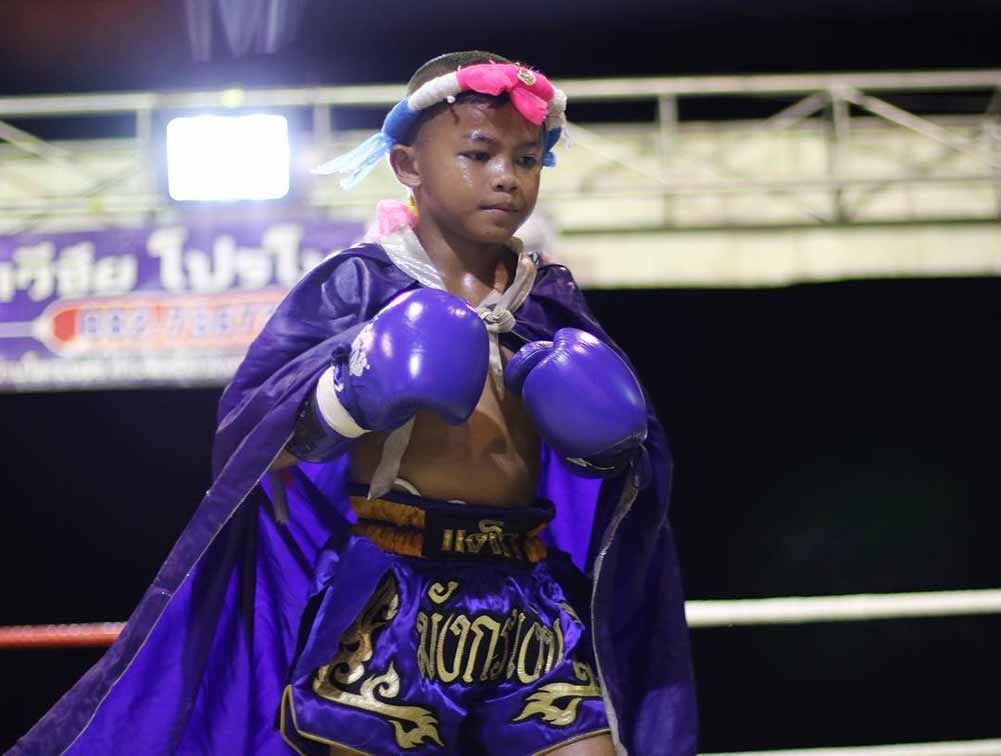
A calm young warrior moments before battle
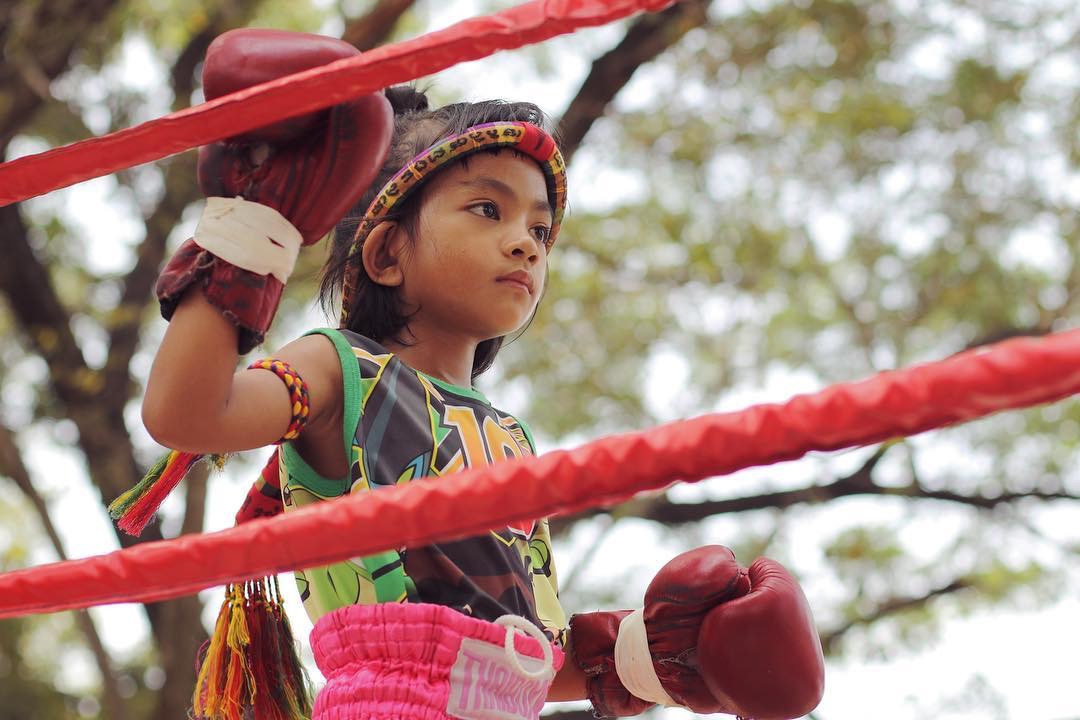 A young Watthana Muay Thai fighter seals the ring during the pre-fight ritual
A young Watthana Muay Thai fighter seals the ring during the pre-fight ritual
Frances manages the various day-to-day operations of the gym. As Boom describes, “she’s the one that takes care of everything there. Now we pay one of the trainers to go train the kids, too. Lots of people there are just doing Muay Thai for fun or to hold pads for the kids, but some of the kids are professional fighters! They have to train every day.”
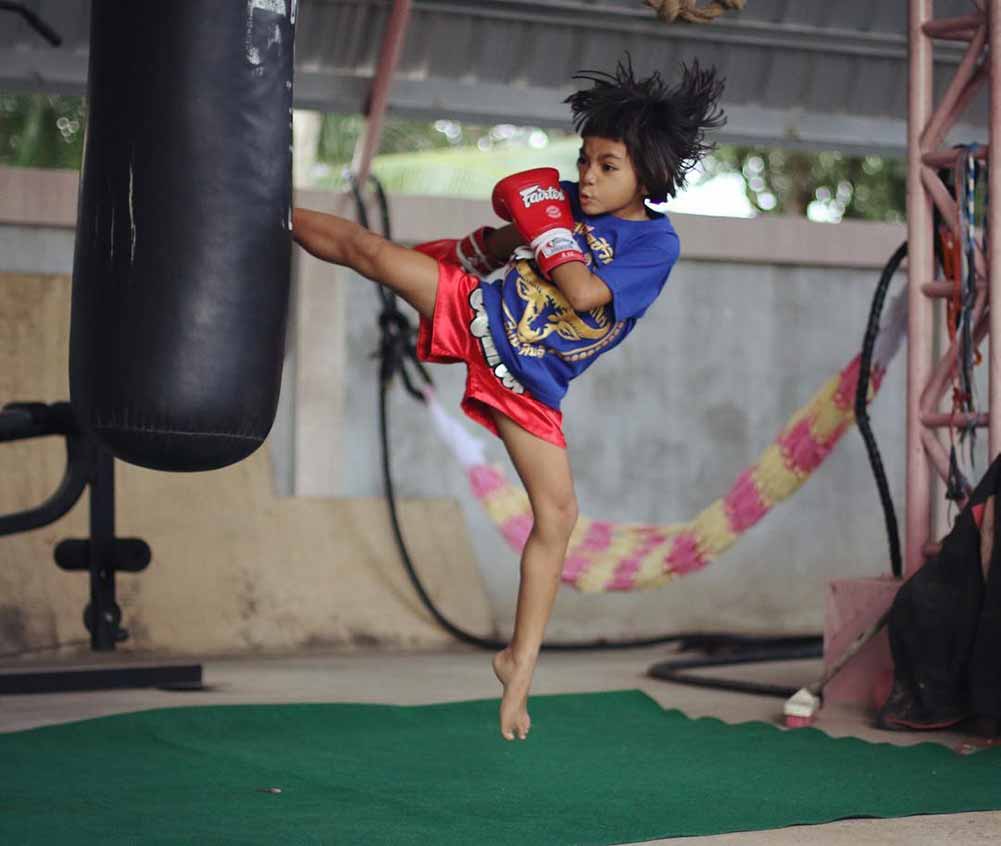
For those who do fight professionally, Wor Watthana provides them an incredible opportunity to achieve their dreams — with resources that Boom did not have for himself. He and Frances, with the help of their donors, are giving the children of Isan the tools and experience necessary for a successful Muay Thai career. Gear like shorts, gloves, hand wraps, and gym supplies such as ice, boxing liniment, tape, and gauze are just some of the necessities these kids would otherwise not have access to.
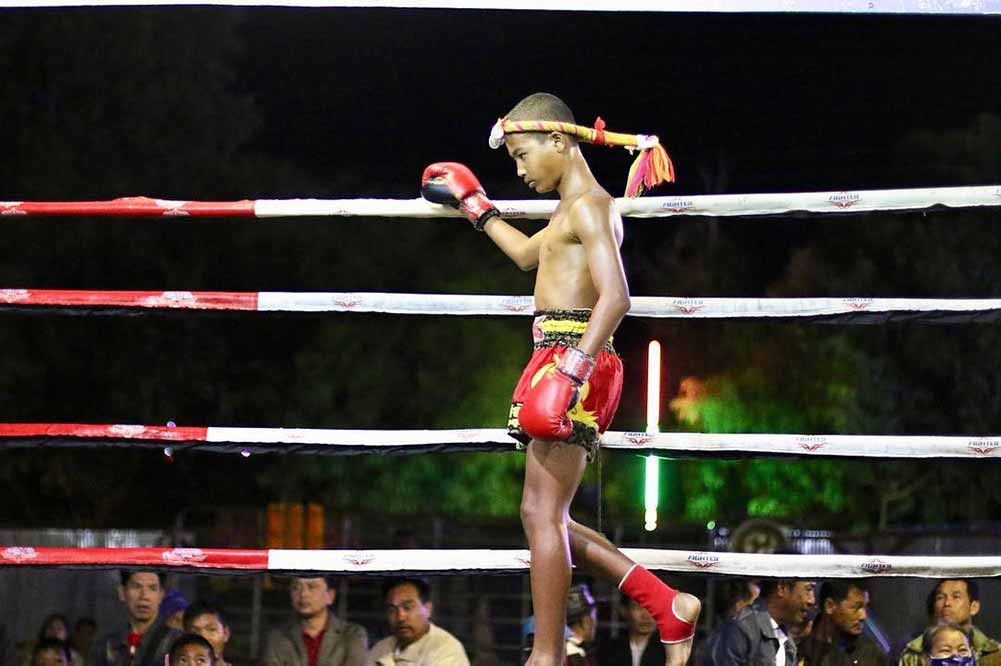
“Some of them are really good professional fighters. They make their own money and save it. Frances helps to organize their money — one [portion] for savings, one to give to their parents, and one to spend,” explains Boom.
The pair’s commitment to using Muay Thai as a conduit of positive change extends beyond their immediate community. Boom elaborates:
“Some of the other gyms around the region bring their fighters to train there. Some of the gyms leave their fighters with us, too. Two of them now stay and we have to take care of them, even though they are from a different gym, whatever — we take care of these kids.”
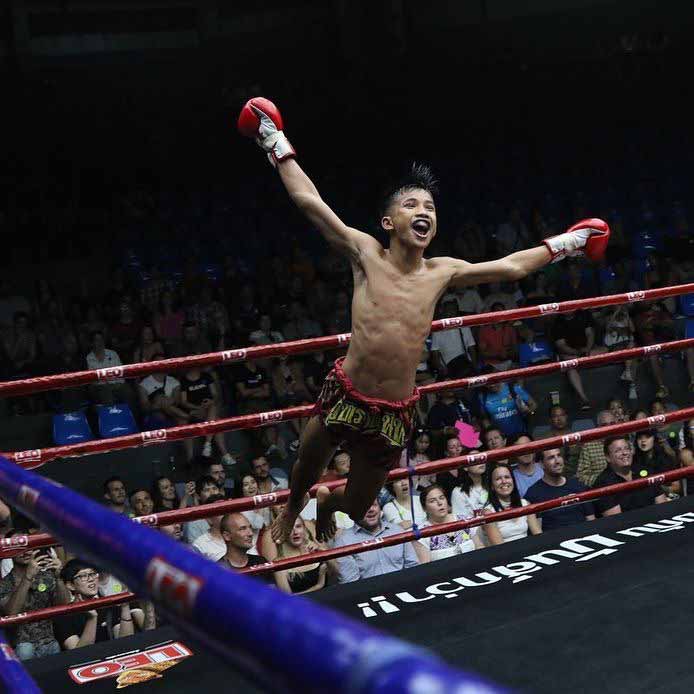
He goes on, marvelling at how Wor Watthana has grown.
“It’s very big for a gym in Isaan. I really appreciate the people that support us. Every day I think about the people that support and help us build the gym”.
When asked how their fighters have been performing, Boom joyfully recounts the story of a young man named Bpaet. Abandoned by his parents at birth, Bpaet was taken in and cared for by his elderly aunt. From the very beginning, he has been a proud member of Wor Watthana Gym.
“Most of the kids that start training, start with us. Most of the kids try, a lot of them train and fight, some of them don’t like it. Some kids think it’s cool, and they come to train…until they have to work hard. Then they don’t like it. Only one kid stayed from the beginning until now. His name is Bpaet. He is a good fighter. He buys lots of stuff for his family [with his winnings], and now he’s saving money for himself. This kid, when he fights, he gives 100%.”
At just fifteen, Bpaet has been victorious in more than 100 bouts, and performed the amazing feat of securing the gym their first championship title. This young man, who began his life with almost nothing, has carved out a future for himself and his family through Muay Thai.
This is the real beauty, the true power of Muay Thai in Thailand: to raise people up and lift entire communities from the shackles of poverty and social ills. As Boom tells me, the area has always struggled with problems like drinking, drugs, gang activity, and violence. Thankfully, Wor Watthana is “a safe space. We can do activities after school, training, homework. All the kids understand, we try to keep them safe.”
While Frances and their daughter live full time at the gym, Boom splits his time between his hometown and Vancouver. When in Thailand, Boom fully devotes his expertise to their fighters.
“I have to go back and check everything there, and the kids want me to be there to train. Especially since some of the kids are becoming pros.”
“They’re big guys now,” he adds, “one trainer is not always enough. Sometimes one trainer has to hold pads for 6-8 kids a night”.
And what motivates Boom to return to Canada, so far away from his family and his fighters (not to mention into the cold)?
“There are lots of reasons why I return here. First thing is that by being here I can try to raise money to build the place for the kids to stay.”
How does DCS win out over a closer job like the one in Malaysia? For a gym in Vancouver to keep him coming back, something special must be afoot.
“I don’t feel like I’m working here, I don’t feel like an employee. I feel like family. If I was at another gym, I don’t think I could handle it” admits Boom. This is his home away from home.
I’ve witnessed the joy with which Boom is received upon his returns to Vancouver, and I have to imagine he gets a well-deserved royal reception when he arrives home in Krabueang Nok.
In 2012, Boom took a fight for an organization called MTA (Muay Thai in America) against five-time world Muay Thai champion Andy Howson. It’s an incredible, back-and-forth war that sees both men dropped multiple times — Boom taking the worst of it. After an especially rough fourth round, the commentators began to speculate that Boom was likely finished. Like the buffalo he had been likened to in his early career, Boom refused to back down from the pressure. Mere moments into the fifth and final round, Boom landed his devastating overhand right. Howson hit the mat face first — just as Boom had described — and the fight was waved off. The first time I saw it, I jumped off my couch, cheering the result of a fight that had happened almost a decade ago.
This is Thanit “Boom” Watthanaya in a nutshell. A true fighter, who has and will continue to overcome overwhelming odds in pursuit of his dreams. As a young kid with very few resources, he harnessed the magic of Muay Thai to make a life for himself, raise himself out of poverty, and even find his soulmate. Now, through Wor Watthana Gym, he is still illustrating the power of Muay Thai as an instrument of social betterment. His community is growing stronger, young fighters like Bpaet have opportunities he could only dream of, and many vulnerable children are being given a brighter future.
“If someone wants to help…just support us. Anyway you can. We try to save this space for these kids. We try to give them a good life.”
Wor Watthana Muay Thai Gym is currently in the midst of a fundraiser to build a bigger facility with which to house the ever-growing number of children who come to them. You can donate to Wor Watthana’s fundraiser here. If you would like to become a monthly supporter of their day-to-day operation, or to sponsor a specific child, check out their website.
Sign up for your FREE TRIAL now.
